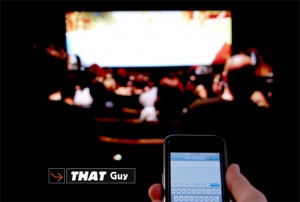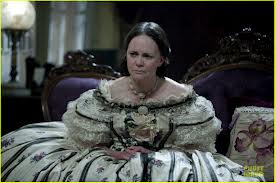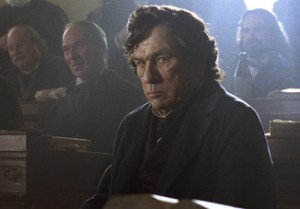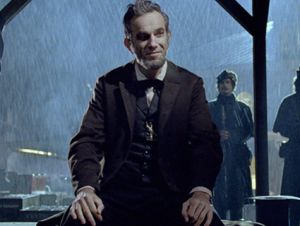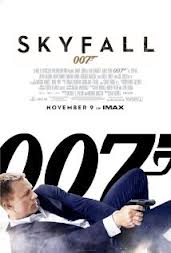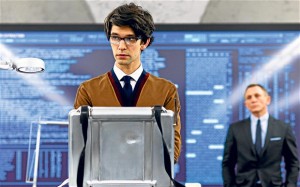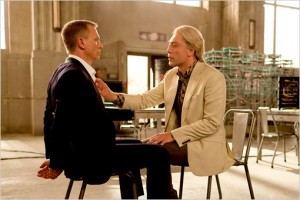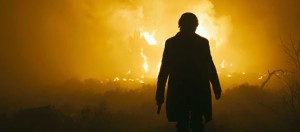Getting out to the movies at this time of year can feel a bit like a crapshoot. It can also feel immensely overwhelming because of the glut of studio product that gets dumped out in time for Oscar consideration. Consequently, those of us who are less on the affluent side are forced to pick and choose between the wealth of cinematic offerings available at your local multiplex. (Similar to what happened with Chicago theatre in the fall season, where at any given point, Sunday in the Park with George, Black Watch, Sweet Bird of Youth, Metamorphoses, and Good People were all playing, amongst dozens of other offerings. Chris Jones attributed the outpouring of high quality theatre to there being ‘something in the water’. I attribute it to a bunch of quality theatre artists working in concert all at once in an effort to collectively blow the minds of the patrons attending these wonderful institutions, all the while dynamiting my checking account with discount offers that are just fine if you’re seeing one or two shows, but not between five and ten. Coincidentally, there will be spaghetti for dinner at my household for the next week and a half.)
Therefore, when I was presented with both a day off and a discounted price for attending a matinee and not just one but TWO high profile releases, I was presented with my first conundrum of the fall season: should I attend Steven Spielberg’s latest docudrama Lincoln, featuring Daniel Day-Lewis and a host of character actors reenacting the last third of Doris Kearns Goodwin’s wonderful biography Team of Rivals? or should I attend the 23rd James Bond movie Skyfall, featuring Daniel Craig as the venerable 007 going up against the psychotic Javier Bardem on an island off of Macao?
The short answer was simple: why not both? And so that is what I did. Tickets in hand, I stepped into the River East multiplex in Downtown Chicago, popcorn at the ready, to take in these two winter offerings.
The result was interesting. Despite one being a Civil War history biopic and the other being a postmodern exploration of the spy genre in the modern world, the two have a great deal in common in terms of thematic content and the treatment of history. This is not to suggest that they work well as companion pieces (Seeing five hours of movies in one day, my tendency is to compare one to the other regardless of what they’re about. This is how I can end up looking at The Artist and The Descendents as films about how to deal with death in a world that is continually passing us by. But I digress.)
Before I begin, however…
THE GRUDGE REPORT: SMART PHONES
Here, I would like to make a public service announcement on behalf of the staff here at the Recorder:
TURN OFF YOUR FUCKING CELL PHONES WHEN YOU WALK INTO A MOVIE THEATRE.
Seriously.
Turn them off.
Both of the movies I attended were sold out. Many people there were excited for these movies. Some of us have been waiting years for these flicks. And movie tickets are not cheap these days. When I go to the movie, I don’t want to be distracted by your phone conversations or by the iridescent glow of your text message screen on your iPhone 27 or whatever the fuck you’ve got in your hand. And trust me, I will see it. I sat in the back of the theatre for both movies, and during the screenings I was able to keep count of the number of cell phone screens that became illuminated. Not by choice, mind you. I’d much rather prefer to watch the movie at hand. That, after all, is WHAT I PAID TO DO WITH MY AFTERNOON. By the conclusion of both movies, I counted 47 times where people took out their phones for any duration of time. Some of those, granted, were repeat offenders, which makes me desire all the more to grab your phone, scold you like a child, and tell you that you’ll be getting your phone back once the movie has finished. Granted, that’s illegal and a good way to a beat down, but by the end of the movie, I just don’t care. It’s simply impossible to maintain focus on the film when there’s a bright fucking light three rows in front of me and to the right, within my peripheral vision, reminding me that someone is complaining to their friend that ‘the people in this movie sure do talk funny’ or ‘this would be better if it were an hour shorter and had more sex’.
What is so important that you can’t (as the pre-show announcements ask you to do) turn off your phone for two hours? Or just not take it out of your pocket at all? Is your own personal sphere of existence so important that you must detract from the movie-going experience of everyone around you?
I wish there were places around Chicago like the Alamo Drafthouse, where shit like this does not go unpunished. Alas, this is not the trend. Worse, I fear that such behavior is only going to get worse as people recognize that it’s nigh impossible to tell someone to shut their phone off in the middle of a movie. ESPECIALLY if everyone else is doing it.
I had no compunctions against going up to a few patrons after the movie and informing them that their texting during the film had partially ruined the experience for me. One of them had no compunctions against telling me to get over myself before walking away. The rest simply stared at me as though I had horns sprouting from my skull. That’s what bothers me: that in an environment where they were OPENLY DEFYING THE THEATER’S ORDERS TO PUT THEIR PHONES AWAY, I WAS THE ONE WHO WAS OUT OF LINE ASKING THEM TO STOP.
Sometimes, it’s hard to be a pacifist.
Having said that, the films.
A Product of Our Times: Lincoln
My major fear, going into Lincoln, was that it would suffer from War Horse syndrome: an over-glorification of its subject matter, portraying Abraham Lincoln as a saint and savior as character actors in wigs danced around pontificating about why slavery is a bad thing. Spielberg is no stranger to massively successful historical dramas; saying that he understands them is like saying Moses had a firm grasp on the Ten Commandments coming down Mount Sinai. Some of his films are counted not only among the greatest movies of the last forty years, but regularly included in the canon of masterpieces of world cinema: Schindler’s List, Saving Private Ryan, Munich, and so on and so on. In his later years, Spielberg has sometimes fallen victim to letting his style take over a piece, making it into something grandiose, Capra-esque, and schmaltzy. (War Horse being the Obvious Case here, as well as Amistad and to a lesser extent The Color Purple.) The fears, especially after a trailer buoyed by a bombastic John Williams music score and highlighted by what seemed to be showboating by several grand actors, were that Lincoln would simply be two hours spent hammering the points down that slavery is bad and Lincoln was a saint in American history.
These fears, I am pleased to say, are reduced to mere afterthoughts by the film. It would be unfair to categorize it on the same level as either of Spielberg’s WWII movies from the 1990’s, but it is not far behind them and is an important addition to the canon of Civil War films.
As far as subject matter, the film deals with the passage of the 13th Amendment during the last four months of Lincoln’s life. Providing an insight into the political wheeling and dealing that went on in a divided House of Representatives in order to secure passage of the bill, the film will be shown in many a high school history class, owing to its wealth of historical figures and entertaining history lessons. Having recently read Team of Rivals, it was a delight to see many smaller moments from the book given life on the screen by Spielberg and his cast of hundreds. It really feels like every successful character actor in Hollywood has been given a small role here, and of particular delight are David Strathairn as Secretary of State William Seward, Bruce McGill as Secretary of War Edwin Stanton, and Hal Holbrook as Preston Blair, head of Lincoln’s Republican Party. A trio of men hired by Seward to bribe, cajole, and otherwise convince House members of voting to pass the amendment are played with wonderful relish by James Spader (almost unrecognizable here), John Hawkes, and Tim Blake Nelson. Jackie Earle Hayley shows up as Alexander Stephens, Vice President of the Confederacy, a man fighting to preserve a way of life that he also recognizes has been long gone. (With the wind, one might say.)
Even with the weight of wonderful acting going on all around, the three leads of the piece stand out with magnificent aplomb. Tommy Lee Jones plays Thaddeus Stevens, a radical abolitionist who must slowly chip away at his moral center in order to assure the passage of his life’s work. His reveal at the end is especially poignant, as we discover what passing this bill has truly meant for him and how the cost weighs heavily upon his soul. Sally Field could have fallen into the trap of playing Mary Todd Lincoln as a woman lost in grief over the death of her son. However, it is a credit both to her and to the skill and sharpness of Tony Kushner’s screenplay that her Mary Todd is both weighted down by mental anguish, yet as sharp and aware as anybody else within Washington. Her mind is at times the equal of her husband’s, and she fulfills her role in his life to a capital T.
Above anything else, the work of Daniel Day-Lewis must be mentioned. Having watched him grow from My Left Foot through Gangs of New York and into There Will Be Blood, an argument must be put forth that he might be the best actor working today. Within this film, he disappears into his character, to the extent that it is only at times that his persona shone through instead of Lincoln’s. He plays the 16th President as though the weight of his times have been upon his shoulders for far too long; his movements are slow, precise, and ‘weighted with history’. His voice, slightly distracting in the trailer, here is grounded, ringing, clear with certainty, a voice that demands to be listened to without resorting to grandstanding or the showboating seen in the House of Representatives. (I would gladly see a return to such tactics in a modern setting however: Nancy Pelosi calling Eric Cantor a ‘fatuous nincompoop’ would make my year, I can guarantee that.) He portrays Lincoln as a man aware of his place in history, dragging the country along with him as he makes choices that he knows will make his nation a better place in the long run, acting with a long view of history. He appears uncomfortable with his projection as a saint of his times, smiling with a slight wince as young soldiers recite his address at Gettysburg back to him, tears streaming down their faces to be in his presence. His jokes, stiff at times, are always precisely targeted to bring a greater understanding to his policies. When he tells a joke at the expense of George Washington while waiting for an important war telegram, it noticeably lightens the tense mood of the room while retaining sharp focus on the duties at hand.
To be certain, there are issues with the movie, though not so large as to be considered problems. The subplot involving Joseph Gordon-Levitt’s Robert Lincoln falls by the wayside, victim to the greater struggles going on around him and his father; this might be intentional, given that Abe says something to Robert to that very effect midway through the movie. Unfortunately, it lacks any clear sense of resolution at the end. (We all know what happens, but some better way of showing the impact upon Robert would have been nice to have. Alas.) It’s almost interesting to see how much Lincoln falls by the wayside throughout the movie; during the middle portion, he becomes a more subtle manipulator, visiting Congressmen to plead with them for passage of his bill. At no point, though, is his influence not felt. This film showcases just how much Lincoln was a mover and a shaker of history, and states that by knowing where we have come from, we might know better where we are now and where we might go from here as our nation progresses through the new millennium.
My Love of Country: Skyfall
Skyfall introduces us to an idea that has only previously been hinted at: James Bond is getting old, he is a boozer and pill addict, his body is failing him, he is tormented by the psychological trauma of his job, and he has a fear of trains.
(I made that last one up, although not by much. See the movie, you’ll see.)
The Daniel Craig Bond movies have taken the iconic character and broken him down into an actual human character, complete with moral failings and second thoughts about his line of work. Gone are the days where Roger Moore would lounge his way through women while jumping across alligators to smash men with metal teeth in the face. Gone are the days of exploding pens (As Ben Whishaw’s character Q explains: “We don’t really go in for that anymore.”) and the Aston-Martins (As Judi Dench asks: “Anything less conspicuous?”). This Bond is a fighter of terrorists, lurking in the shadows. With the ending of the Cold War, it has taken almost a decade to identify where the villains of Bond’s world are hiding. No more are they sinister Russians petting white cats. Here, the threats come from cyber warfare, terrorist organizations, and how in a casino in Monte Carlo, the house game is Texas Hold ‘Em Poker. (My biggest complaint against Casino Royale, an otherwise solid introduction to Craig’s Bond).
Bond has come a long way since the days of Dr. No, and while Sam Mendes has made the most realistic Bond movie to date, little moments pop out that pay homage to where Bond has come from. As a movie, Skyfall is filled with nostalgia mode references, be it leaping on the back of a komodo dragon to safety (Live and Let Die’s crocodile escape) or smaller lines such as when Bond hands off an important document for M, citing it is “for your eyes only”. (Guh.) By making such overt references throughout, the film successfully allows for Craig to claim everything about the role as his own while giving Bond the history that he has always needed; one doesn’t simply become a cold blooded lady killer without going through some serious trauma of some kind. In this regard, Skyfall bears a great resemblance to The Dark Knight Rises, the movie that finally allowed Batman to come into his own as the savior that Gotham always needed. Here, we see how Bond becomes the man he needs to be.
The plot here is thin: Javier Bardem’s villain is out for revenge, not to take over the world, not to destroy it, but to strike back at his former employer, M, who he feels misused him and abandoned him in his time of need. This is not to say that his Raoul Silva is not a threat; he’s absolutely terrifying. He knows all of the steps that must be taken, he’s not afraid to die, and he’s willing to stop at nothing to achieve his revenge. When he is briefly captured by Bond (following an interrogation scene for the ages), there is a striking visual resemblance to Silence of the Lambs, in the nature of his holding cell, his psychological attack on M, and in his physical and mental scarring that have resulted in his current madness. Apparently, all one needs to give Bardem in order to make a horrific villain is a weird haircut and he’s off to the races.
Earlier, I mentioned that the two films are similar; one of these is through their cinematography. Janusz Kaminski’s work on Lincoln is marvelous, and by now he has a rapport with Spielberg that allows for simple, elegiac storytelling that occasionally lends itself to marvelous imagery. (Of particular note is a shot through a curtain of Lincoln holding his youngest son Tad.) With that being said, Roger Deakins shoots Skyfall as if it was No Country for Old Bond. His work is astounding; several images seem as though they should be framed in galleries rather than in a James Bond movie. There can be no doubts that this is the greatest looking Bond movie ever; it would be interesting to think that his work for the spy franchise is what finally earns Deakins the Oscar that not only should have been his by now, but should have been named for him. The opening sequence is masterfully shot, as are a silhouetted fight in Shanghai, a casino in Macao, and the last 45 minutes of the movie. Mendes’ directs with a gentle hand, taking the series into places that it hasn’t been before, and the results are striking. Given the relatively fluffy contents of much of the series, this might in fact be the greatest all around James Bond movie ever. Ever.
(Oh, and this theme song’s pretty good too.)
The main similarity between the two movies is their self-awareness of history. Lincoln knows where he will stand in the march of time and is seen thinking ahead on what will come next; Bond, meanwhile, is fighting to stay relevant, something he achieves by the end of the movie. Both men know their place in history, yet both men must keep up with the current times for radically different reasons. At one point, Judi Dench’s M is called upon to testify as to the relativity of the place of men such as Bond in a modern world, to which she replies that such men are always needed. In Lincoln, we are reminded as viewers of what great men have done and that great times always call for such men. Time marches on, and whether or not we go along for the ride is entirely up to us.
As I mentioned earlier, I wouldn’t suggest these two movies as regular companion pieces. This is simply what happens when you walk out of one movie and right into the next one. With that being said, both are high quality works of cinema that are very much worth your movie going dollars. Both are wonderful choices to be seen on the big screen, if only for the power of the acting and wordplay in Lincoln and the sheer visceral intensity and beautiful imagery of Skyfall.
Please, though: if you go to see either or both of them, turn off your cell phone. Please.


